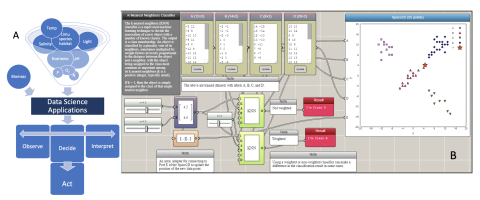Body
Image

Connecting Traditional Knowledge and Emerging STEM Through Smart AgTech
Aquaculture is historically significant to Native Hawaiians. Fishponds were essential for food production and held special cultural significance. This project will study integration of sustainable aquaculture practices embraced by Native Hawaiians for centuries with emerging agricultural technologies (AgTech) focused on sensors, measurement, and data science literacy. Students will use smart farming technologies focused on data science to make decisions on growing limu (seaweed). The Institute for Future Intelligence (IFI) and the Pacific International Center for High Technology Research (PICHTR) will collaborate to develop an integrated STEM curriculum focused on AgTech that will connect traditional and modern practices in aquaculture. This research project will investigate: 1- can the project enhance student learning of AgTech, data science and AI concepts and practices through Integrated STEM, 2- can the project increase interest in STEM when traditional knowledge are integrated into the curriculum and 3- can the project improve equitable STEM education leading to increased interest in careers in agriculture and aquaculture. Students outcomes include: learning emerging AgTech and data science practices, learning STEM within the context of historically significant aquaculture in Hawaiian society, conducting scientific research in aquaculture and preparing students to enter the STEM workforce with knowledge of current AgTech practices.
Pillar 1: Innovative Use of Technologies in Learning and Teaching
We will use integrated STEM to bring innovative technologies into the classroom. Integrated STEM require that the curriculum find ways to embed all STEM disciplines. We will develop an AgTech curriculum that uses smart farm approaches, combined with problem-based learning that will allow students some independence and creative input within the constraints of the curriculum. The Jukebox is a closed smart farm with environmental control systems and sensor technologies for data acquisition and processing.
Pillar 2: Partnerships for Career and Workforce Preparation.
The curriculum will immerse students in the growth of a historically important crop in Hawaii, limu, while preparing them for a career in AgTech. The approach we will take follows the paradigm of: Observe, Interpret, Decide and Act, connecting traditional knowledge with modern AgTech practices. Students will work with community mentors to learn both modern AgTech practices (Oceanic Institute, Windward Community College) as well as traditional Hawaiian aquaculture approaches (Waikalua Loko Iʻa Fishpond).
Pillar 3: Strategies for Equity in STEM Education
This project will be launched in the Castle-Kahuku district on Oahu, Hawaii, where 43% of the student population is Native Hawaiian or Pacific Islander and 44% of the students are considered economically disadvantaged. The curriculum will focus on connecting STEM and AgTech with traditional Hawaiian practices, connecting these students with community members that may serve as mentors and future employers. Students will learn valuable STEM concepts while learning meaningful skills that contribute to food security.

Discipline(s)
Chemistry
Data Science
Emerging Tech (Artificial Intelligence, Quantum Computing, and Blockchain)
Target Gradespan(s)
High school (9-12)
Target Participant(s)
Youth / students
Educators
Project Setting(s)
Formal Education
Category
Developing and Testing Innovations (DTI)